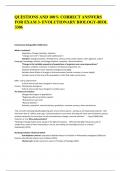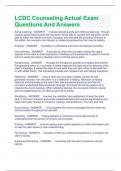QUESTIONS AND 100% CORRECT ANSWERS
FOR EXAM 3- EVOLUTIONARY BIOLOGY-BIOL
3306
Evolutionary Biology (BIOL 3306) Notes
What is evolution?
Adaptation, Change, Mutation, Selection
“Change over time” (“Descent with modification”)
Examples: biology (evolution, development, cancer), physics (solar system, stars, galaxies), culture
(language, knowledge, fashion), technology (airplane, computer, communications).
“Change in the heritable properties of populations of organisms over several generations”
Examples: antibiotic resistance in bacteria, HIV disease progression, etc.
Excludes development of an organism (ontogeny) and aging
Excludes direct effects of changes in the environment (secular increase in human height)
Includes cancer at the level of the population of cells that make up the tumor
SARS - CoV-2 spike protein
2.5% of amino acids have changed in about 2 years
Human - Chimpanzee divergence
0.6% of amino acids have changed in 6 million years
The theory of evolution
Changes that happen in populations
“Beginning with one primitive species”
“Branched out over time”
“Natural selection”
Evolution, speciation, natural selection, gradualism, common ancestry, other mechanisms.
“Life on earth evolved gradually beginning with one primitive species - perhaps a self-replicating molecule - that
lived more than 3.5 billion years ago; it then branched out over time, throwing off many new and diverse species;
and the mechanism for most (but not all) of evolutionary change is natural selection.” - Coyne (2009) Why
Evolution is True Why study evolution?
“Nothing in biology makes sense except in the light of evolution … Without that light it becomes a pile of
sundry facts; some of them interesting or curious, but making no meaningful picture as a whole.” -
Dobzhansky (1973)
Studying Evolution: Historical sketch
Jean-Baptiste Lamarck- proposed a detailed theory of evolution in Philosophie zoologique (1809) and
Histoire naturelle des Animus sans vertèbres (1815)
Charles Lyell- attacks Lamarck’s views in Principles of Geology (1833)
, Charles Darwin- sketches out his theory of evolution by natural selection and shows it to a few colleagues
(1842)
Robert Chambers- anonymously publishes a popular defense of evolution: Vestiges of the Natural History
of Creation (1844)
Alfred Wallace- publishes a paper defending evolution (1855). He discovers natural selection, writes a
paper about it, and sends it to Darwin (1858).
What took so long? Lack of direct
evidence
Poor understanding of biology
Uncertainty over the age of the earth
The argument from design
Lack of a plausible mechanism
“Some species that appear in the fossil record are not alive today”
Extinction
Georges Cuvier (1769-1832)
Was not a biologist, never believed in evolution.
Established the legitimacy of extinct species
“If the earth is young, evolution is impossible.”
James Ussher (1581-1656)
Ussher estimated that the first day of creation began at nightfall preceding Sunday, October 23, 4004 BC
(proleptic Julian calendar).
Although there was plenty of evidence for evolution, there was no plausible process that could account for it in
principle (a similar problem occurred with continental drift in geology)
Jean-Baptiste Lamarck (1744-1829)
Proposed that evolution was caused by: Use and disuse, direct effects of environment on organisms,
inheritance of acquired characteristics, an inherent tendency towards higher complexity.
Biography
The study of finding what species reside in a certain area.
Continental islands: sit on a continental shelf (e.g., Greenland, Great Britain, Ireland,
Sicily, Barbados, Trinidad, Sumatra, Java, Tasmania, Falklands) Tend to be large, old, and
close to a continent more often than far
Oceanic islands: do not sit on a continental shelf and usually have a volcanic origin
(e.g., Galapagos, Azores, Cape Verde, Aleutian Islands, Hawaii Islands, Mauritius, Marianas) Tend to be small,
young, and farther from a continent more often than close
Definitions
Distribution: where (spatially) a species is found
Composition: which species are found somewhere
Diversity: number of species
Abundance: number of individuals of a species
Native: arrived in Hawaii by natural means





